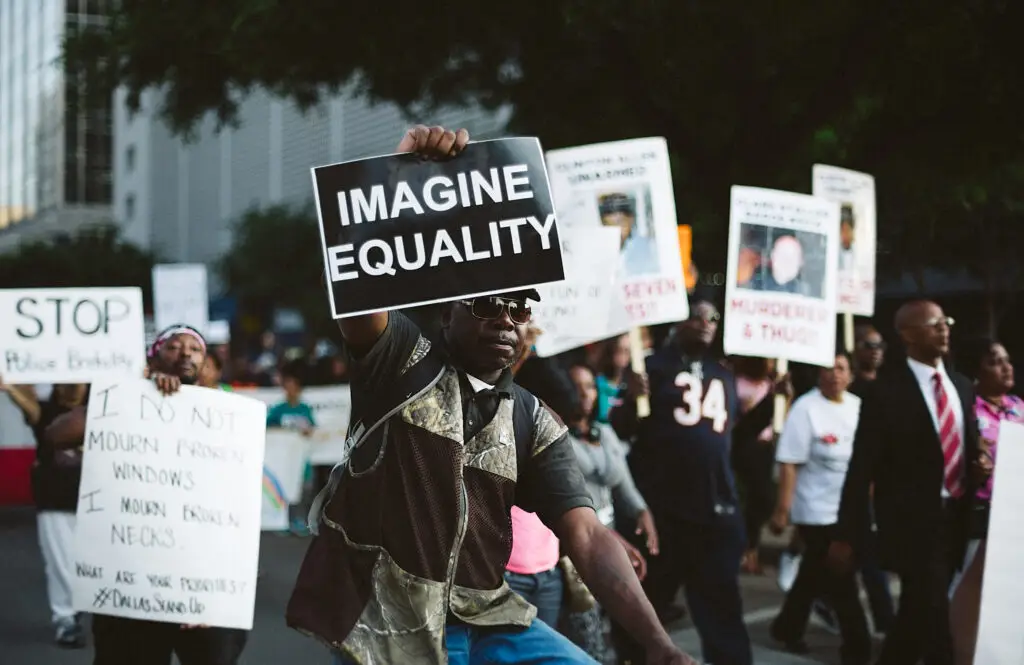One of the most popular slogans from protestors over the last couple weeks is, “silence is violence, silence is compliance.”
The slogan suggests people—especially white people—who are silent about the perceived racist basis for George Floyd’s murder are complicit in systemic racism and racist police brutality against George Floyd and other black people.
The slogan has been repeated and retweeted by many people, including Christians, to compel others into speaking out against perceived systemic racism.
However, there are major theological implications to the slogan. If the slogan is true—if silence is violence, if silence is compliance—then what the Bible describes as wisdom is foolishness. And especially: if silence is violence, if silence is compliance—Jesus is a sinner.
Social justice ideology is a religion for people who make gods out of their skin-colours or self-interests. Social justice ideology is a religion with its own orthodoxies and heresies, its own priests and prophets, its own sacred slogans and confessions or catechisms—and particularly, its own version of sin and righteousness.
Therefore, after social justice followers experienced a revival a couple of weeks ago—one of the most righteous things a person can do right now, in their mind, is speak out against perceived systemic racism. And consequently, according to their rhetoric, one of the most sinful things a person can do right now is to be silent about perceived systemic racism.
Social justice ideology is a religion for people who make gods out of their skin-colours or self-interests.
However, Black Lives Matter isn’t the standard for righteous reactions to injustice—the Bible is. And according to the Bible, silence isn’t always compliance to injustice or sin.
The Bible says, “Open your mouth for the mute, for the rights of all who are destitute. Open your mouth, judge righteously, defend the rights of the poor and needy.” (Proverbs 31:8-9
God commands us to speak for justice. That’s why I’m a pro-life advocate. That’s why I’m a blogger. I know we Christians have a responsibility to affirm justice in a culture that labels evil as good and injustice as justice.
Nevertheless, we’re not only called to open our mouths, we’re also called to open ears—so we can be quick to listen and slow to speak.
But we shouldn’t open our mouths if we haven’t first listened carefully and judged righteously. After all, there’s a time to be silent, and a time to speak (Ecclesiastes 3:7
And although God commands us to hate evil, love good, and establish justice—he doesn’t command us to speak out against every act of injustice. In fact, in Jesus’ earthly ministry, he didn’t speak out against most incidents of injustice.
At the time of Jesus’ earthly ministry, Israel was colonized and exploited by the Roman Empire. The Romans systemically oppressed Israel by forcing them to pay severely high income taxes that forced 90% of Israel’s population into poverty. That is the context behind the Pharisees’ question to Jesus about taxes to Caesar in Matthew 22.
However, Jesus instructed them to pay taxes in obedience to God and Caesar, and he remained silent about the Roman Empire’s oppressive system against Israel.
Jesus didn’t speak out against Tiberius Caesar’s oppressive system, and he didn’t speak out against Herod Antipa’s injustices either—not even after he arrested and murdered John the Baptist.
If silence is violence, if silence is compliance—Jesus is a sinner, and we have no hope of salvation—no hope for a king of kings who will return to execute perfect justice.
In fact, Matthew 14:13
Jesus was silent about many instances of oppression and injustice. Does that make him complicit in Caesar’s oppression against Israel? Does that make him complicit in John the Baptist’s murder? Does that make Jesus a sinner?
According to the logic of the slogan, Jesus isn’t sinless. Jesus isn’t righteous. And therefore, he isn’t our saviour from sin.
That is the implication of an ideology and a slogan that puts more hope in protesting and rioting than the perfect righteousness of Christ. And it’s a shame so many Christians are forgetting we’re much more than activists for a cause—we’re ambassadors for Christ.
If silence is violence, if silence is compliance—Jesus is a sinner, and we have no hope of salvation—no hope for a king of kings who will return to execute perfect justice.
But it’s easy to forget that when we embrace an ideology, a religion that demands our complete and unwavering submission and worship.
This article originally appeared at Slow To Write and is republished here with the author’s permission.
Follow Samuel Sey:
-
- Twitter | @SlowToWrite
- Facebook | @SlowToWrite
- Instagram | @SlowToWrite
- Website | www.slowtowrite.com























